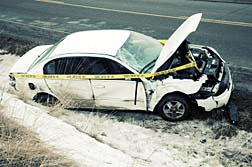 To that end, another driver could get off scot free, because somebody wasn't paying attention to neither the road conditions, nor the regulations governing winter driving.
To that end, another driver could get off scot free, because somebody wasn't paying attention to neither the road conditions, nor the regulations governing winter driving.Either scenario could cost you money. If the normal complexities of a car accident in sunny, dry weather could leave your head swimming, imagine the issues that come into play when roads are icy, windshields are frosted up and there is snow swirling everywhere. Like a dense fog, only worse.
Most people living in northern climes don't even think about adapting to winter driving conditions until it's too late. Okay, perhaps you do. But does everyone else? What are your rights?
First, you don't need snow to have a slippery road. It could be wet—a possibility even if the weather is below freezing, due to the consistent traffic on the asphalt. Constant traffic keeps the asphalt warm, and ice-free.
But not everywhere. In a high wind, an open and exposed area of the highway can turn icy as the high wind flash-freezes the pavement. And you don't know you're upon a skating rink, until you're on top of it sliding sideways. Or at least, when the guy in front of you is.
Same for bridges. The road right up to the bridge may be fine, but the pavement over the bridge could likened to a skating rink; a winter car crash waiting to happen. That's because you're got cool, damp air underneath the bridge. The ground below static pavement could be warmer, but there's nothing underneath asphalt over a bridge accept cold air and the concrete infrastructure that conducts the cold right up through the pavement, and the water on top that is now, suddenly ice.
The posted speed limit holds little authority in a northern winter. Drivers are required to adjust their speed to the road conditions—and that's a subjective thing. You want to allow yourself a lot of room for subjectivity.
Have you cleaned all the frost from your windshield, and ALL of the glass in your vehicle? You don't want your vision obscured. Same holds true on the inside. Are your defrosters working? Can you see? Or have you allowed yourself to try and navigate through a small hole you've scraped off in front, with the edge of your credit card?
Do you have a sufficient supply of washer fluid in the on-board reservoir? Just as importantly, is it the correct formulation? Washer fluid that freezes on contact and builds up ice no matter how warm your windshield, won't help.
The attraction of traction
Front wheel drive cars, like all-wheel drive vehicles and SUVs have excellent traction in the snow. But they can't stop any faster. SUVs often provide drivers with a false sense of security—as do sporty little front-wheel drive cars with narrow tires that dig deep through the snow, and go like spit. But on a slippery road, you often cannot STOP as fast as you can START.
Winter, or snow tires which are formulated with a softer rubber compound than regular tires, provides better traction in snow and ice. Many swear by them, and some areas even require them. The province of Quebec, in Canada, has mandated that all vehicles on provincial roads require winter tires. However, too many unwise drivers mistakenly think that winter tires are super tires, allowing you to drive in the snow and on the ice any way you please. That's not true. Even with winter tires, you HAVE to adjust to the driving conditions.
Many areas of the country have laws pertaining to the failure to remove excess snow and ice from a vehicle left outside. A driver may clear off the windshield, rear windows and side glass areas. Headlights, and tail lights too. However, if there is a ton of snow and ice sitting on top of the minivan or SUV, it could be a problem at higher speeds. It may not be an issue sitting in the driveway, or poking down a quiet street on your way to buy milk. But when you hit 60 miles an hour on a clear, dry interstate that snow and ice up there isn't going to be up there for long, and could prove an issue for the guy travelling behind you.
Or for you, if the guy up front didn't do his job. Suddenly, you're driving in the midst of a blinding blizzard from all that snow coming off the roof or the car, or truck up front.
Know the winter driving laws for your area
The State of New Jersey, for example, has had an ordinance on the books since 1997 that tickets a motorist when snow, or ice dislodges from a vehicle and causes injury or damage to a pedestrian, or other property—such as YOUR car.
Recently, that law has been strengthened, giving police officers and Sate troopers the ability to pull over any vehicle seen driving with accumulated snow or ice.
READ MORE CAR CRASH LEGAL NEWS
And what happens if someone slides into you? There are many variables, and arguments the other motorist can employ, to protect his insurance rating by minimizing his liability and attempting to park most of the blame with you.
Involved in a winter car crash? Call a lawyer skilled in the legal environment associated with the winter car accident. Lest the defense of your car crash in snow, turn into a legal whiteout akin to any blizzard you've ever driven through…
Know your rights, and know a lawyer…
